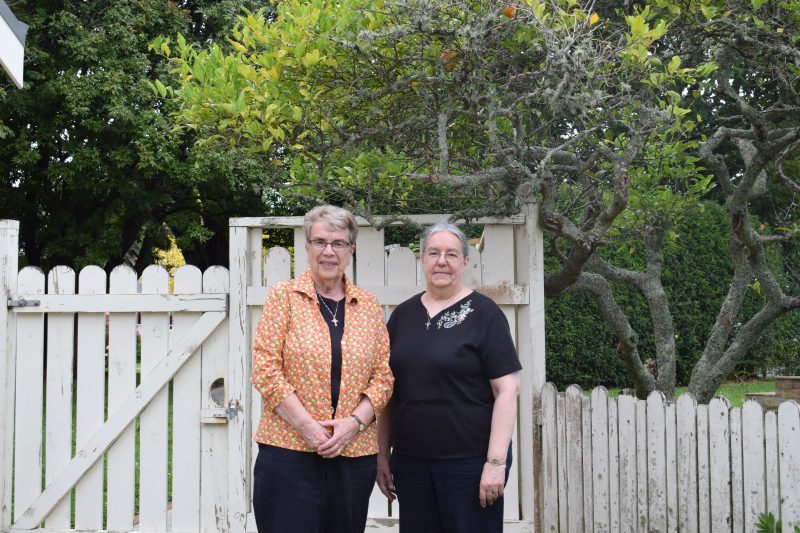A new consciousness or culture of inclusiveness and interconnectivity is needed if the earth is to have a future.
This was the message of American Dominican sisters Sr Margaret Galiardi and Sr Sharon Zayac who gave talks around New Zealand to “unpack” Pope Francis’ encyclical Laudato Si’. They gave their first talk at the Pompallier Diocesan Centre in Auckland on March 9.
Sr Galiardi, from Amityville, New York, runs retreats and lectures in the US on ecological theology and spirituality while Sr Zayac’s latest work delves into evolutionary consciousness as an emerging world view.
Sr Galiardi said Pope Francis’ encyclical “is not one of those documents that we work on, put down and say done. It’s something we’re going to have to keep coming back to, keep pushing the boundaries of”.
The sisters said that in order to go beyond Laudato Si’, human beings need a new understanding of who we are, who God is, what our relationship is to earth and who others are.
Sr Zayac noted, “because of our numbers, because of our exponential growth, because of our many and varied technologies, we have become the most powerful species in the planet. We have the capacity to determine how earth will continue to evolve and even whether or not she will”.
She said faith has taught us that we are made in the image and likeness of God.
“And though we have long interpreted that to mean that we are therefore masters over the rest of creation, that does not hold up in the biblical exegesis now being done with the Scripture,” Sr Zayac said.
She said both faith and science tell us that humans evolved from earth; the word “adamah” is used in Hebrew and “adam literally means earthling”.
“God took this last creature and blew into it God’s very own breath thus forming this newly made adam, earth creature, into the image of God,” she said.
“Being formed in God’s image means we are meant to act like God, to act as God acts, to cocreate, co-participate with God in the building up of creation so that the whole of it might flourish, “Sr Zayac said, adding that humankind is meant to be a “blessing to the earth”.
Metaphors
Sr Galiardi gave several metaphors for thinking about God: “the Creator of a self-creating universe”, “Creator of all here with us now pouring God’s self out in love”, “Divine far-nearness”, “love seeking to manifest”, “overflowing communion of self-giving love (in reference to the Holy Trinity)”.
“We begin talking about who is God in the context of contemporary scientific understanding of the universe and we end up talking not only about God, but also about creation and the universe because it is all in God,” Sr Galiardi said.
“From the understanding of the divine, we learn what is good and how to resist oppression,” she said.
“These [understanding of God through the metaphors] are markers as we build this new culture.”
In examining humanity’s relationship to the planet, Sr Zayac noted how the explosion of knowledge, ideas and sciences led the Western culture, in particular, astray.
“She [earth] was no longer seen as that communion of subjects living in a balance of relationships but as the collection of objects, of resources . . . that we use to make our lives as humans less subject to the forces of nature and one of more comfort and more convenience,” Sr Zayac said.
However, now, those same sciences are giving us an understanding of how deeply interconnected we are to earth.
In Laudato Si’, the Pope reminds us that earth belongs to the Lord, Sr Zayac pointed out, “and that we humans have no right to disrupt the harmony of creation by our behaviour and attitude that have increasingly turned it into ‘an immense pile of filth’”.
She noted how Pope Francis, while not the only pope to speak about the integrity of creation, is the first one to devote a whole encyclical to it.
“Earth is our greater selves. And that [realisation] has to change the way we look at things,” stressed Sr Zayac. “What we do to earth, we literally do to ourselves.”
Finally, in understanding others, Sr Galiardi said, “there is no other. We are all one”.
Sr Galiardi suggested that in order to grow into this new consciousness, Christians should practise intentional silence.
“This is the moment when God does in us what we don’t even know needs to be done for us and the entire universe,” Sr Galiardi explained. “We begin with the intention that we want to give ourselves over to God so that God can renew us, make us into the people we need to be in the entire world at this point in time.”

Reader Interactions